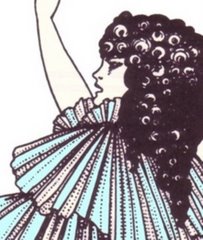©1999-Richard Carlton
All the debris that’s left of love’s attraction
old happy photographs, a happy song
a ring perhaps,
thoughts that won’t be gone…
the ghosts of our old satisfaction.
And in the dawning of a bright new day,
sometimes it’s good to sweep the past away,
not unremember’d but
still treasured with our old sweet laughter
in a special place set apart.
On some rainy afternoon
every now and then,
we’ll look through our box of souvenirs…
The old dancecard,
the smile we loved the camera kept for us,
no one can blame us if we shed some sudden tears
we all know however brave,
underneath there beats the longing heart.
Sunday, August 27, 2006
Sunday, August 20, 2006
Allen's "The Bookburner"
 ( Text 172)
( Text 172)The Bookburner: "I'll tell you a secret: that book is no longer here. I burned it."
"But you loved it!"
'”I burn one each month."
"Is it always the one you love most?"
"No, not always."
"Why though? Why? It was beautiful--"
"I burned it carefully ...page by page."
"Did it hurt?"
"Not while it was burning."
"Does it now?"
"That book is a beautiful memory, it's a part of everything I do now. To burn a book was hard, the first time, I cried, and I didn't even like the book, in fact disliked it. The second time I chose one I did like, not one of my favorites of course. It hurt. But gradually, after that, book by book, I did it more simply, ritually. Without thinking or feeling very much. Then: I burned the beautiful book. Only yesterday. We merged bloods in the burning, 'fires of purification' if you wanta get gooey about it. Whoops--loss of voice there, come back. So. Yes. I burn books. But no one else knows. My brother preferred live things and burned ants in the sun, with a magnifying glass, large, large in my keeping...."
©2006-Allen Sutterfield
Monday, August 14, 2006
Allen's Text 3899
means is a a pocket of past
even this is cheating
but to sit down and
COMPOSE
your real, that’s something
think about it if you can
you are a little hunk
hung in a dark web
where certain lines intersect
one of your functions
(is that the unpoetic word?)
to do this, sit down and compose
your real
like a cat on piano keys
romping giant floors of dark
here you sit
while the comets whiz
not far away
jostling the web’s great lines
as the millennia go like seconds
my age come upon me like the hooves of long ago
pounding on a door someone had locked
so the sparkling electron
one could say this moment was
takes the page/with the wording
and it’s going on that does it/when you least suspect
it’s an easy mind
can follow no trail
©2006-Allen Sutterfield
even this is cheating
but to sit down and
COMPOSE
your real, that’s something
think about it if you can
you are a little hunk
hung in a dark web
where certain lines intersect
one of your functions
(is that the unpoetic word?)
to do this, sit down and compose
your real
like a cat on piano keys
romping giant floors of dark
here you sit
while the comets whiz
not far away
jostling the web’s great lines
as the millennia go like seconds
my age come upon me like the hooves of long ago
pounding on a door someone had locked
so the sparkling electron
one could say this moment was
takes the page/with the wording
and it’s going on that does it/when you least suspect
it’s an easy mind
can follow no trail
©2006-Allen Sutterfield
Wednesday, August 09, 2006
Allen's Text 518
I hear a distant bell and children singing. Below the carpenters handle delicately a mammoth pane of glass, so clear it seems they carry a piece of the Invisible. The radio squawks and gabbles, tuned on an outlandish frequency. In an outer corridor a woman walks down stairs, confusing the walls into a white silence. Magenta and blue plaster, the city on the hillside sits patiently in the rain, rife with a stolidity learned of centuries (the sun will come again). It is the moon's day, incipient and wet. In the small black-bordered room (No. 37-A) at the back of brain I play solitaire with a deck of live cards, faces contorting in mockery, the vain reflections of a thousand mirrors. The skin is rubbery and unreal, the numbers and symbols in black and red profusion weave and cross - now there are thirteen where there were three, now two where once ten. The hour glass, brought from Arabia by camel, pours an endless stream of moments in a golden string. Suddenly an alarm sounds, the cards, are abandoned to their private vices, I rush from the table to the windows - the parade has begun. Slowly in spectacular file the myriads inhabiting the assorted rooms pass by. The day will end in a bloody sunset, despite the heavy promise of the clouds. Always a spectator! Always!
©2006-Allen Sutterfield
©2006-Allen Sutterfield
Sunday, August 06, 2006
Ferryboat and Traveler
A Korean Poem
I am the ferryboat
You are the traveler.
You tread on me with muddy feet,
I embrace you
and cross over the water.
When I embrace you,
Deeps or shallows
or fast shooting rapids,
I can cross over.
When you don’t come I wait from dark to dawn,
in the chill wind, the wet of snow and rain;
Once over the water you go on without a glance back.
No matter, I know that sooner or later you will come,
While I wait for you, day after day I go on growing older.
I am the ferryboat, you the traveler.
©Han Yong-un

I am the ferryboat
You are the traveler.
You tread on me with muddy feet,
I embrace you
and cross over the water.
When I embrace you,
Deeps or shallows
or fast shooting rapids,
I can cross over.
When you don’t come I wait from dark to dawn,
in the chill wind, the wet of snow and rain;
Once over the water you go on without a glance back.
No matter, I know that sooner or later you will come,
While I wait for you, day after day I go on growing older.
I am the ferryboat, you the traveler.
©Han Yong-un
Catching a Bug
A Korean Poem
 When I catch a bug in the room
When I catch a bug in the roomAll of a sudden
I realize that the bug is myself,
I open the window and
look into the distance.
A bird flies across the blue sky.
It flies to the branch of a tree.
sitting there it begins to sing,
Singing
In which I hear the ancient sound of crying.
When I catch a bug in the room
What do I grasp?
What do I miss?
©2006-Bong Bong
Saturday, August 05, 2006
Allen's Text 128
 Writing was on wall for Pompeii's citizens
Writing was on wall for Pompeii's citizensPOMPEII, Italy--Our cities may be overrun with graffiti, but they are barely scratch hitters compared with the ruins of Pompeii. The Pompeiian’s were past masters of the small talk that makes walls talk.
Pompeii's light-hearted scrawls, and even the many nasty ones, are now cherished leftovers from 79 A.D., when the Roman resort town died in a volcanic eruption.
Graffiti - literally meaning "scratches" - go far back into history. In Pompeii, they were the town news and gossip, in Latin or Greek, long before the days of newspapers or books.
Love, money and politics were the basic themes, and nobody hid their thoughts. "Salve lucrum" ("Hurrah for profit"), proclaimed a joyful inscription in a trader's house. And a lover wrote on a public wall, with Pompeiian zest: "You have never seen Venus? No need: look on my fair one, she is as exquisite."
There was so much electioneering on any available flat expanse--"Proculus, support Sabinus, and he'll support you"--that a householder worked his own plaintive message onto his whitewashed wall: "Painter, I beg you not to write anything here. If you inscribe a candidate's name, may he fail in the elections."
When angry Pompeiians scrawled, "Let the wrath of Venus fall on any one who does damage here," it had nothing to do with love. That was a warning to passersby who might forget themselves and mistake the street or wall for a lavatory.
Thousands of these markings remain, giving us a keyhole view of Roman life. It almost seems as though any Pompeiian who had a passing thought felt compelled to add it to the groaning walls of houses or alleyways. Cartoonists burlesqued gods and gladiators, and there was no shortage of indecent sketches.
There was so much of this sort of thing that it inspired a favorite Pompeiian couplet found in a number of places: "I wonder, wall, that you do not go smash, who have to bear the weight of all this trash!"
The walls did go smash. Mt. Vesuvius wrote the last message.
--Field News Service --
©2006-Allen Sutterfield
Tuesday, August 01, 2006
Allen's Text 900
 Well, then, the end of something, a station reached, the ticket is no longer valid. Discards litter all emergences, going from the train that carries us so quickly along the psyche’s rails. The green and red winking signals along the tracks are left in the nearer distance behind, beyond lies only an infinite plain, the unmarked countryside of the future, flat and smooth from this isolate platform. Yet already the lattices are being laid, the engines begin their slow mounting hum, over there a ticket agent, issuing the single billet printed for such travel. The swinging lanterns of the brakemen, orange eyes in the death dance of the present, thrust lines of glow, hook, catch, in their blatant rhythm, the moments fall and die like torn stubs, tossed beneath the roaring impatient wheels of l’Express! Boarding, one takes with him only a suitcase of memories, a small bag of alpaca visions, the dust gathered in the corners of 10.000 days and nights, stretching behind like so many pieces of rail, so many abandoned ties. Soon will come the day crew, the firemen, the torch, and the cinders will blow a grey fragmented storm against the sky. But you will not know or notice, always the future travels faster than the past, it is its business to do so. You will not know riding through the interminable honeycomb of days and hours, moments and years, in the amber coach of dream, for all those miles and hours, those forests of minutes, vast tundras of time are so much magic now, standing in the present, a moment unburdened, having finished whatever the something-now and ready to depart.
Well, then, the end of something, a station reached, the ticket is no longer valid. Discards litter all emergences, going from the train that carries us so quickly along the psyche’s rails. The green and red winking signals along the tracks are left in the nearer distance behind, beyond lies only an infinite plain, the unmarked countryside of the future, flat and smooth from this isolate platform. Yet already the lattices are being laid, the engines begin their slow mounting hum, over there a ticket agent, issuing the single billet printed for such travel. The swinging lanterns of the brakemen, orange eyes in the death dance of the present, thrust lines of glow, hook, catch, in their blatant rhythm, the moments fall and die like torn stubs, tossed beneath the roaring impatient wheels of l’Express! Boarding, one takes with him only a suitcase of memories, a small bag of alpaca visions, the dust gathered in the corners of 10.000 days and nights, stretching behind like so many pieces of rail, so many abandoned ties. Soon will come the day crew, the firemen, the torch, and the cinders will blow a grey fragmented storm against the sky. But you will not know or notice, always the future travels faster than the past, it is its business to do so. You will not know riding through the interminable honeycomb of days and hours, moments and years, in the amber coach of dream, for all those miles and hours, those forests of minutes, vast tundras of time are so much magic now, standing in the present, a moment unburdened, having finished whatever the something-now and ready to depart.©2006-Allen Sutterfield
Subscribe to:
Comments (Atom)


